Years ago, when I was busy coordinating media trips into some of the last remote places in the country, all with the intent of sharing the challenges our last great, wild landscapes faced from the pervasive forces of “progress,” I learned the value of meticulous planning.
Inviting members of the press – and, later, the digital media – to come and see America's best wild places and learn of the threats they faced from the drill bit, the mining shovel, the chainsaw and the road grader was, in my mind, a high calling. Sharing the stories of these places was vital in order to save them.
It required some serious planning. Coordinating flights, lodging, transportation and, in many instances, meals and drinks for upwards of a dozen people was challenging. Over time, I got good at it. Like down-to-a-science good. It's a skill I use more today than I ever have. Planning travel, and, in my case, planning fishing travel, involves a lot of moving parts. And, just as with anything else, timing is everything.
Full disclosure here: I never intended to be a “booking agent.” And, as one of three founders of a fly fishing and adventure travel company, I loathe the notion of being labeled as such. But, truth be told, that's probably what I do more now than anything else these days. And that meticulous planning I learned all those years ago? It's even more important today, as I work to make sure clients are armed with all the information they need to have a successful trip. So, obviously, that's lesson No. 1. Planning is vital if you want to venture out on a trip, even if you intend to leave the minute details to someone else. But there's so much more involved in putting a good trip together, whether it's for yourself or a group.
If you can, plan a year out
It’s a tall order, but I promise you, you’ll eliminate many of the gremlins that can work their way into the process. By identifying a destination, doing some basic research on that destination — like calling someone like me and talking through everything from the best time to be at your chosen location to what travel looks like when it’s time to go — you’ll be in pretty good shape.
But a year ahead? Overkill? No. Booking a year out gives you more advantages over your traveling compadres. First, you’re much more likely to secure the dates you want (but that’s not always the case — some lodges allow guests to rebook at the end of their week each season, but you’ll at least be able to get on a waiting list). Second, you’ll be able shop flights over the course of a year rather than just a few months. Airline rates vary greatly, depending on the season and the “dynamic” pricing they use when they have an unexpected number of empty seats, or a spate of full flights.
And, believe it or not, for truly high-demand destinations — it can sometimes pay to plan as far as 18-24 months ahead of time.
Develop a relationship with your agent or destination
Often, as we communicate over time, clients, agents, and the folks that run lodges and other destinations strike up real friendships. With inquisitive anglers frequently touching base with questions, and with agents following through on reminders for things like travel insurance or airline price alerts, the process can be enjoyable. I like to send clients fishing updates from their chosen destination, just to keep them up to speed and hopefully create some excitement.
A far-flung fishing trip is a real adventure, whether you’re heading into the heart of the Yukon to chase pike and lake trout or half a world away in Patagonia or New Zealand, getting an email every few weeks is a great way to build excitement about your trip that, whether it feels that way or not, is really just right around the corner.
Ask questions
Interested anglers are quick to reach out with questions. While we try to provide as much information up front as we can, some things get missed in the barrage of emails and phone calls. Welcome packets sent via email fade into the ether and previous conversations can be forgotten. So never hesitate to reach out with questions. What flies do you need? What weight rods are required? Do you need to bring your own gear? How big a tip do you need to bring? Can they accommodate your vegetarian fishing buddy? Do you need travel insurance? It’s always good to get these questions out of the way early, and then you can focus on any new gear you might need, or what fly patterns to spend some time tying.
Between when we make a reservation for a client and when they travel, we do our best to communicate. But things can get lost in the shuffle. So never hesitate to pick up the phone or fire off an email. Just like you, we want to make sure you have the best trip possible, so make sure there are no questions left unanswered.
What if it’s a spur-of-the-moment thing?
Last-minute travel can be exciting, even if you’re starting the process late in the game. Often, there are really good reasons for traveling on the spur of the moment. Perhaps your booking agent alerted you with an opening at your favorite lodge due to a cancellation. Or maybe the lodge didn’t fill a couple of dates, and they’re fast approaching — pro tip: this is when you might be able to score a discount (but keep in mind, your late flight booking might eat at least some of that savings).
Sometimes, when we book bigger groups to lodges, one of our clients has to bail for some reason or another. That’s when we get on the phone — lodges don’t like empty beds or empty boats, and if we can find someone, it helps everyone involved. It’s a tough sell, getting folks to commit to a trip with just a few weeks before traveling, but it’s doable. Your year long anticipation will be boiled down to a much shorter time period, and it can seem manic.
The best outcome? You’ll have a great trip, and see for yourself just how much better it is to travel when you’ve given yourself plenty of time to plan.




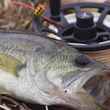



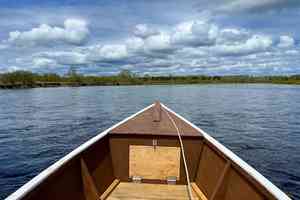




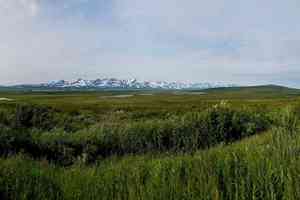


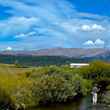




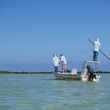




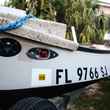
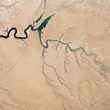
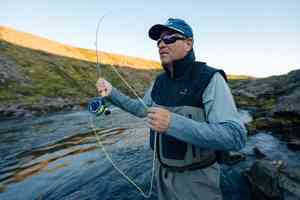


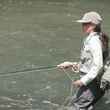

Comments